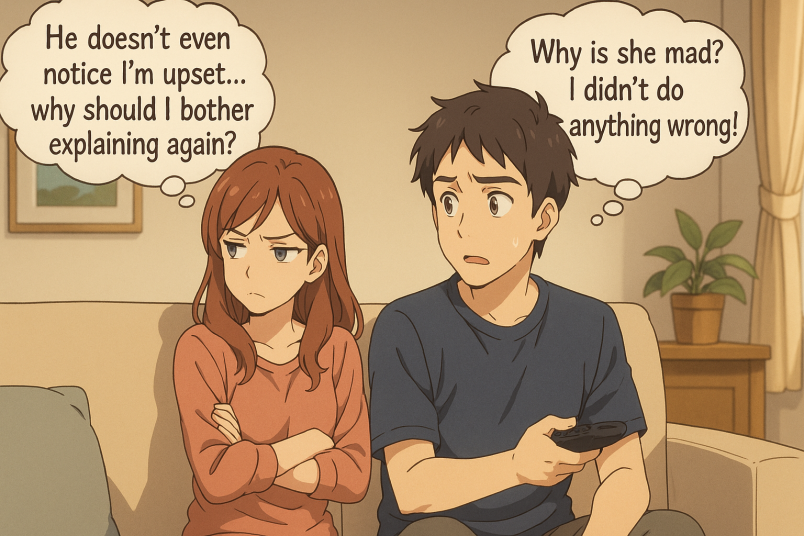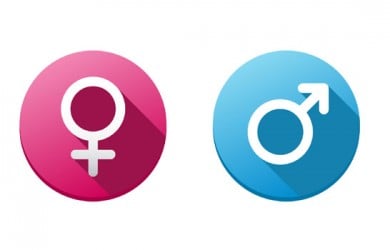Why Are Women so Difficult? The Real Reasons Behind the Myth

Heal & Grow Daily for a Happier Relationship
Subscribe FREEKey Takeaways
Marriage.com AI Quick Summary
Sometimes it feels like women are a mystery; warm one moment, distant the next, open, then quiet… and you can’t quite figure out what changed.
It’s easy to sigh and think, “Why are women so difficult?” especially when emotions or expectations get tangled up in ways that don’t seem to make sense.
But what if there’s more happening beneath those reactions, layers of care, protection, or unspoken hurt?
People often confuse emotional depth with difficulty, and sensitivity with drama. In truth, what feels confusing is often just someone trying to connect, to be seen, or to feel understood. When you start to notice that difference, “difficult” starts to look a lot more human, and maybe even beautifully so.
What does it really mean when people say “women are difficult”?
When people say “women are difficult,” it usually comes from confusion, not truth. Sometimes it’s frustration, sometimes hurt, and sometimes it’s just not knowing how to respond to emotions that feel bigger or more complex. Many forget that women are often taught to communicate, feel, and protect differently.
Studies show that women tend to think more holistically, connecting ideas intuitively rather than focusing solely on logic or details. The structure of the female brain enhances intuition, empathy, and verbal ability, allowing them to perceive concepts in broader, interconnected ways compared to the linear thinking often seen in men.
What seems like mixed signals can actually be a quiet way of asking for care or space. It’s not about being complicated for the sake of it; it’s about being human in a world that doesn’t always listen the first time.
5 reasons women sometimes seem emotionally complex
Emotions can be tricky for anyone, but women are often described as having deeper emotional layers that seem hard to understand.
It’s not that women are complicated just for the sake of it; their feelings often reflect a mix of empathy, awareness, and emotional intelligence that runs deeper than it may appear on the surface.
1. They process emotions through connection
Women often process feelings by talking them out and seeking understanding rather than quick solutions. This can look like overanalyzing, but it’s actually a way to feel safe and heard.
When emotions run deep, conversation becomes a bridge to clarity, comfort, and balance, not confusion or contradiction.
- Scenario: Imagine she’s upset after an argument and wants to talk about it again later. She isn’t trying to reopen the wound; she’s trying to process and reconnect emotionally.
2. They experience multiple emotions at once
It’s common for women to feel conflicting emotions, such as joy mixed with worry or love with frustration. These overlaps can seem confusing to others, but it’s simply how emotional awareness works.
Women tend to notice subtle shifts in energy and meaning, which can make their inner world feel rich but occasionally overwhelming.
- Scenario: She might feel proud of her partner for working hard, yet lonely because they spend less time together. Both feelings are real, and holding them together doesn’t mean she’s confused—it means she’s emotionally aware.
3. They are often more empathetic
Empathy allows women to sense what others feel, sometimes even before it’s spoken. While this is a beautiful strength, it can also make emotions heavier to carry.
Feeling deeply for others may blur boundaries at times, making it harder to separate their own emotions from those around them.
- Scenario: If a friend or partner is stressed, she might start feeling tense too without realizing why. It’s her empathy tuning in, not overreaction or mood swings.
4. They carry emotional memory
Women often remember emotional details long after an event has passed, not to hold grudges, but because feelings leave lasting imprints.
A tone, a word, or a moment can stay vivid for years. This emotional recall helps them protect themselves and others, though it can make forgiveness and letting go more complicated.
- Scenario: If she suddenly brings up something you said months ago, it’s not to start a fight. That memory lingered because it mattered emotionally, even if the moment felt small to you.
5. They balance strength and vulnerability
Many women live in a space between resilience and sensitivity. They’re expected to be strong, yet open-hearted; calm, yet expressive.
Balancing those two sides can feel like walking an emotional tightrope. What looks like unpredictability is often just the quiet effort to stay true to both strength and feeling.
- Scenario: She might hold back tears during a tough conversation to stay composed, then cry later in private. It’s not a contradiction but a balance between being strong and still allowing herself to feel deeply.
Are communication styles the real reason behind misunderstandings?
Sometimes misunderstandings aren’t about love fading or effort lacking; they’re simply about how people communicate. Women often express emotions to connect, while men might focus on solving the problem. One person wants to be heard, the other wants to fix it, and suddenly, both feel unseen.
Research indicates that behaviors like mansplaining, interruption, and ignoring the input of women are often seen as gender-biased. Across three studies, women reacted more negatively and perceived these behaviors as biased when men displayed them, highlighting persistent communication inequalities in interactions.
That’s usually where the question “Why are women so difficult to understand?” sneaks in.
But it’s not difficulty; it’s difference. When words come from different emotional languages, even small things can sound bigger than they are. Learning to listen for meaning, not just words, can turn confusion into closeness.
Why are women so difficult? Perception vs. reality
It’s easy to hear someone say, “Women are so difficult,” and nod in agreement without really thinking about what that means.
But is it truly about difficulty, or about misunderstanding?
Often, what people see as complicated is actually just emotional awareness, unspoken needs, or a difference in how feelings are expressed. Sometimes, women expect connection while others expect logic—and when those two meet, things can get lost in translation.
Here’s a simple look at how perception can differ from reality:
| Perception | Reality |
|---|---|
| She overreacts too easily | She’s expressing hurt or disappointment that hasn’t been acknowledged |
| She changes her mind too often | She’s reevaluating based on new emotions or context |
| She’s being distant | She needs emotional space to process before reconnecting |
| She’s too sensitive | She values emotional honesty and wants to be understood |
| She’s hard to please | She’s asking for emotional effort, not perfection |
What looks confusing on the surface often has kindness, care, or emotional intelligence underneath. The truth is, women aren’t “difficult” for the sake of it; they just tend to communicate through deeper layers of feeling.
When those layers are met with patience instead of judgment, relationships start to make a lot more sense.
Do expectations and social roles make women seem demanding?
Sometimes what people call “demanding” is really a reflection of the roles women are expected to play. They’re often taught to care deeply, keep everything running smoothly, and meet everyone’s needs even when no one notices how much that takes.
When those same women ask for effort, attention, or balance, it can sound like pressure instead of partnership. But what’s really happening is a quiet request for shared responsibility, for emotional and practical support that feels equal.
Here’s what that often looks like in real life:
- She takes on most of the emotional or household labor without being asked.
- She feels guilty for needing rest or help.
- She worries that expressing needs will seem “too much.”
- She’s praised for multitasking but rarely for setting boundaries.
- She keeps the peace at the cost of her own calm.
So no, women aren’t being too demanding; they’re responding to invisible expectations that never seem to rest. When those roles are shared with care and understanding, the idea of “too much” slowly fades, leaving space for a relationship that feels fair, loving, and real.
7 tips for men (and partners in general) to better understand women
Understanding women isn’t about cracking a secret code; it’s about slowing down, listening, and noticing what’s really being shared—through words, tone, and quiet moments in between.
Connection comes from empathy, not guessing games. Here are 7 thoughtful ways men, and partners in general, can begin to understand women with more care and confidence.
1. Listen to understand, not to fix
When a woman shares what she feels, she usually wants to be heard, not corrected. Trying to solve her problem too quickly can make her feel unheard or dismissed. Instead, listen with full attention; nod, ask gentle questions, and show empathy.
Let silence have space too—it often says more than words. Listening this way builds trust, showing her that her feelings matter just as much as the facts.
Here are some ways to approach it:
- Maintain eye contact and put away distractions when she’s talking.
- Repeat or summarize what you heard to show you’re listening.
- Ask, “Do you want advice or do you just want me to listen?”
2. Notice what she values most
Everyone has emotional priorities, and for many women, connection and reassurance sit high on that list. Paying attention to what makes her light up, calm down, or pull away reveals what she truly needs.
Maybe it’s words of appreciation, quality time, or small gestures that say, “I care.” Observing those cues helps deepen understanding without her needing to explain every time.
Here are some ways to approach it:
- Watch how she reacts to affection, gifts, or time spent together.
- Ask what makes her feel loved or appreciated most days.
- Do more of what brings her joy, even in small, everyday ways.
3. Validate her emotions, even when you disagree
You don’t have to share the same feelings to acknowledge them. Saying “I can see why that upset you” or “That sounds frustrating” makes her feel safe and seen.
Dismissing her emotions, even gently, can close the door to communication. Validation builds emotional closeness; it tells her you respect her perspective, even if you’d handle it differently.
Here are some ways to approach it:
- Respond with empathy instead of quick logic.
- Use calm language like “I get that” or “That makes sense.”
- Avoid phrases such as “You’re overreacting” or “It’s not a big deal.”
4. Communicate your feelings too
Understanding goes both ways. When you share your emotions honestly, it helps her understand you better and feel trusted. It also breaks the pattern of one person always doing the emotional work.
Simple expressions like “I felt hurt earlier” or “I’m nervous about this” can shift the tone from distant to open. Vulnerability may feel risky, but it’s one of the strongest bridges to intimacy.
Here are some ways to approach it:
- Start small with honest statements like “I felt” instead of “You made me feel.”
- Choose calm moments to share rather than emotional highs.
- Let her know you trust her enough to be open, even when it’s hard.
5. Learn her love language
Some people feel loved through words, others through actions, time, touch, or gifts. Discovering her love language helps you connect in ways that actually reach her heart.
If she values quality time, being present matters more than a grand gesture. When you speak love in her language, even small efforts can feel deeply meaningful, and that consistency builds a bond that lasts.
Here are some ways to approach it:
- Take a love language quiz together and compare results.
- Ask her what gestures or moments make her feel closest to you.
- Practice showing affection in the way she values most, not just the way you do.
6. Respect her need for space
Even the most affectionate people need time alone to process, recharge, or simply breathe. If she pulls back for a while, it doesn’t always mean something’s wrong. Respecting that space shows emotional maturity and trust.
Give her room to come back when she’s ready, and she’ll often return feeling lighter, not distant. Space can actually strengthen connection when handled with calm understanding.
Here are some ways to approach it:
- If she seems withdrawn, say, “Take your time—I’ll be here when you’re ready.”
- Use the time apart to focus on your own self-care or hobbies.
- When she returns, don’t rush her to talk; let the connection happen naturally.
7. Keep learning who she is
People grow, shift, and change with time, and understanding a partner is an ongoing process. Stay curious about her—her dreams, worries, and evolving needs. Ask open questions like “What’s been on your mind lately?” and really listen to the answers.
Treat knowing her as a journey, not a task. When you keep showing interest, she’ll feel cherished for who she is today, not just who she was yesterday.
Here are some ways to approach it:
- Have regular “catch-up” moments about how you’re both feeling in life.
- Ask thoughtful questions about her goals, passions, or challenges.
- Celebrate her changes instead of resisting them; growth keeps love alive.
Watch this TED Talk in which mediator Larry Rosen reveals how understanding hidden emotions can resolve conflict and deepen human connection:
Can understanding emotional differences improve relationships?
Understanding emotional differences doesn’t just make relationships easier; it makes them feel safer, softer, and more real. When both people realize that feelings don’t always show up the same way, empathy replaces frustration.
Suddenly, what used to sound like “too much” starts to feel like depth, and what seemed distant begins to look like calm reflection. Here are a few gentle ways emotional awareness strengthens a bond:
- Fewer misunderstandings and less unnecessary tension.
- More patience when emotions surface differently.
- A greater sense of trust and emotional safety.
- Deeper appreciation for each other’s perspectives.
- Stronger teamwork during conflict or stress.
Emotional differences aren’t barriers but invitations to grow closer. When both partners take the time to listen, adapt, and honor how each person feels, the relationship becomes more than just understanding; it becomes a place where both hearts can truly rest.
Toward empathy and real connection
So maybe the question isn’t really “Why are women so difficult?” but why we sometimes forget to look deeper. What feels complicated is often just emotion expressed differently, love shown in another language, or care that comes with layers.
Women aren’t puzzles to solve; they’re people trying to be understood, just like anyone else. When we slow down, listen with kindness, and stay curious instead of critical, connection becomes easier. It’s not about difficulty at all—it’s about learning how beautifully complex human hearts can be.
 Tips
Tips
Write your tip or submit a video tip
All tips are reviewed before the publishing.
Share this article on
Recent Articles
Related Quizzes
Heal & Grow Daily for a Happier, Healthier Relationship
Subscribe FREE on YouTube We'd love your feedback!
We'd love your feedback!
 Expert Q&A
Expert Q&A
Ask your question related to this topic & get the support you deserve from experts.


 Reviewed by
Reviewed by
















 Thanks for your feedback!
Thanks for your feedback!